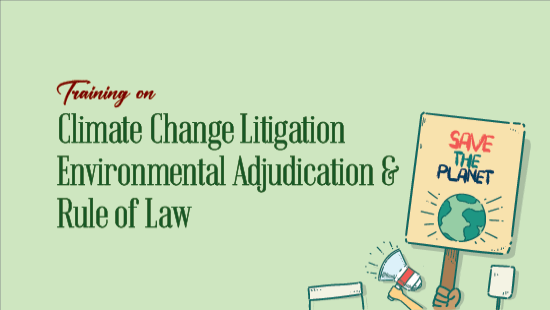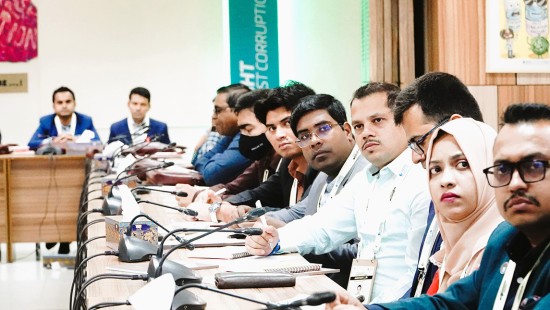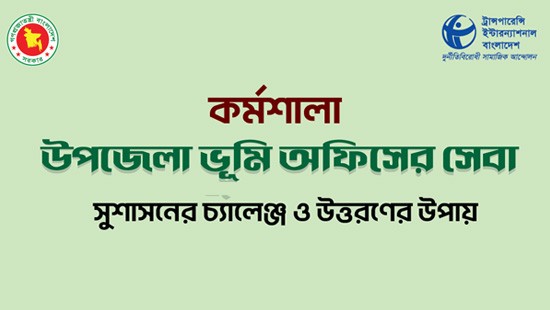Published: 13 March 2025
"We are serving thousands of citizens by cleaning the city, why will the government not serve us?" This is how Saijuddin, a waste worker of DSCC’s Zone-1, Ward-20, expressed his expectation of the city administration at a workshop organized by TIB on March 8, 2025, to observe International Women's Day.
Waste workers cleaning the roads of densely populated Dhaka are the backbone of the city’s solid waste management system. Yet, they remain neglected in decision-making, and their contributions go unrecognized. TIB organized this workshop titled "Inclusive Solid Waste Management: Experience and Voices of Waste Workers" to honor their work and provide a platform to voice their challenges and aspirations.
Fifty waste workers, both men and women, participated, representing diverse backgrounds, including street cleaners, sweepers, drainage cleaners, and garbage handlers. Through interactive sessions, they shared their struggles, including inadequate protective gear, low wages, lack of maternity benefits, and job insecurity.
Milton Sardar from DSCC’s Zone-2, Ward-2, highlighted the financial strain of supporting a family on meager wages, often requiring a second job. Laxmi Marra from DSCC’s Zone-4, Ward-38, pointed out that workers must buy their own hygiene supplies due to a lack of provision from city authorities. Parul Akter from DSCC’s Zone-3, Ward-28, raised concerns about women’s safety, as street cleaning begins at 2 AM, making female workers vulnerable to harassment.
Despite their hardships, waste workers exhibited a progressive mindset, recognizing the specific needs of their female colleagues. Mohammad Saijuddin acknowledged: "Women waste workers require additional benefits, such as maternity leave, security during night shifts, and access to toilets at work. They are our colleagues, and in times of emergency, they help us first before our families do. It is our responsibility to ensure their well-being."
However, workers also revealed a gap in representation within decision-making structures. Saijuddin further noted: "Neither our union nor city corporation supervisors have ever seriously considered these matters."
In the final session, workers collectively assessed their job conditions through a participatory ranking exercise. Issues such as personal security, maternity leave, fair recruitment, occupational safety, and skill development were ranked as the most pressing concerns, reflecting their dissatisfaction with the current state of affairs.
A major barrier to change is the communication gap between waste workers and city decision-makers. Urukula Ishak from DSCC Zone-2, Ward-6, emphasized: "We know the Mayor is the highest authority, but we lack access to him. The highest level we can reach is the Conservancy Inspector. When our demands go unheard, we have no further avenues."
To bridge this gap, participants proposed establishing ward-based grievance redress forums to enable direct communication with decision-makers.
The workshop underscored the importance of training and skills development, an opportunity that waste workers have long been denied. Mohammad Jilani from Dhaka North City Corporation (DNCC) Zone-3, Ward-35, expressed his aspiration: "We have never attended a program like this before. We need more workshops and training sessions."
Fair recruitment remained another core demand. Om Das from DSCC Zone-4, Ward-30, urged: "We want a corruption-free hiring process so that deserving candidates get fair opportunities."
The lack of job security and retirement benefits emerged as another critical issue. Mohammad Ramizuddin from DNCC Zone-3, Ward-36, explained: "Some of us have served for 25 to 30 years, yet we are still not considered permanent staff. Unlike graded officials who retire with pensions, we leave with nothing. After decades of service, we are left without savings or housing."
Recognizing the indispensable role of waste workers in maintaining a clean and healthy city, TIB Executive Director Dr. Iftekharuzzaman concluded the workshop with a call for justice and reform: "TIB is honored to stand with you today. While we alone cannot resolve all these issues, we take responsibility for advocating for the changes you wish to see in your employment conditions. Our country may have resource constraints, but if we ensure equitable distribution, your demands can and must be met."
This International Women's Day, TIB amplifies the voices of Dhaka's waste workers, calling on policymakers and city authorities to recognize their contributions and uphold their rights. An inclusive, transparent, and just system is not a privilege—it is their right.













